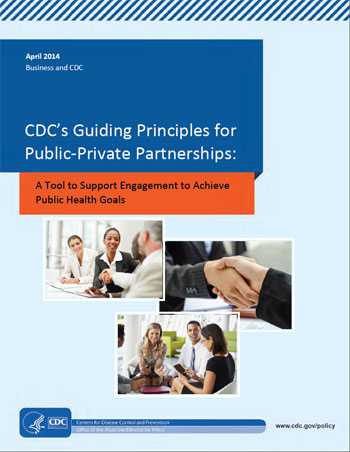Partnering with CDC
- Partnering with CDC Factsheet
Why Partner?
CDC works with the private sector because public-private partnerships advance CDC’s mission of protecting Americans. Public-private partnerships are powerful tools that help extend public health’s reach to save lives in the workplace and at home, speed innovation, and change the way CDC conceptualizes and solves problems. There are opportunities for both formal and informal collaborations that can lead to valuable, mutual benefits.
Contact Us
For public-private partnership questions, or to provide input on how CDC can support your health and safety efforts, contact privatesector@cdc.gov.
For other health-related questions or comments, contact CDC Info via an online request form or by phone (800-CDC-INFO).
For more information on how to contract with CDC, click here.
-
Benefits for Private Sector Partners:
- Access specific populations or professional groups
- Collaborate on innovative products
- Share private sector perspective on health issues
- Access resources, guidelines, and information
- Enhance reputation, brand loyalty, and goodwill
-
Benefits for CDC:
- Connect to organizations that share our goals
- Extend reach of CDC messages and programs
- Improve CDC innovation through collaborative R&D
- Solve problems through new technology
- Raise awareness about CDC’s lifesaving work
How to Partner with CDC
Private sector partners include for-profit businesses, professional organizations that represent businesses, philanthropies, and private individuals/groups.
Public-private partnerships at CDC involve CDC staff cultivating dynamic formal and informal collaborations. There is a wide spectrum of these collaborations at CDC. These relationships can involve funding or no funding at all.
Opportunities for public-private partnerships at CDC are numerous:
- A Memorandum of Agreement (MOU/MOA) can be used to describe in very broad terms the mutual understandings, concepts, goals, and plans shared by the parties.
- CDC’s Technology Transfer Office facilitates use of Collaborative Research and Development Agreements (CRADAs).
- CDC’s Gift Policy outlines how CDC can legally accept gifts from outside entities.
- CDC’s Ethical Considerations for Public-Private Partnerships describes the process CDC uses to review all gifts for potential conflicts of interest.
- CDC’s Sponsorship of Conferences Policy outlines required procedures for co-sponsoring an event.
- CDC Grants includes information on applying for a Funding Opportunity Announcement (FOA). All CDC grant and cooperative agreement opportunities are posted on www.grants.gov .
In some cases, partnerships are arranged through the CDC Foundation. The CDC Foundation, which began operating in 1995, supports numerous program activities that extend the impact of CDC’s work.
Although the CDC Foundation was chartered by Congress, it is not a government agency nor is it a division of CDC. It is a private, nonprofit organization classified as a 501(c)(3) public charity. To connect with CDC Foundation, click here.
CDC's Guiding Principles

To learn how CDC and the Private Sector can work together, read CDC’s Guiding Principles for Public-Private Partnerships: A Tool to Support Engagement to Achieve Public Health Goals.
CDC Foundation

The CDC Foundation helps the Centers for Disease Control and Prevention do more, faster by forging effective partnerships between CDC and others to fight threats to health and safety.
- Page last reviewed: January 15, 2016
- Page last updated: April 11, 2017
- Content source:


 ShareCompartir
ShareCompartir